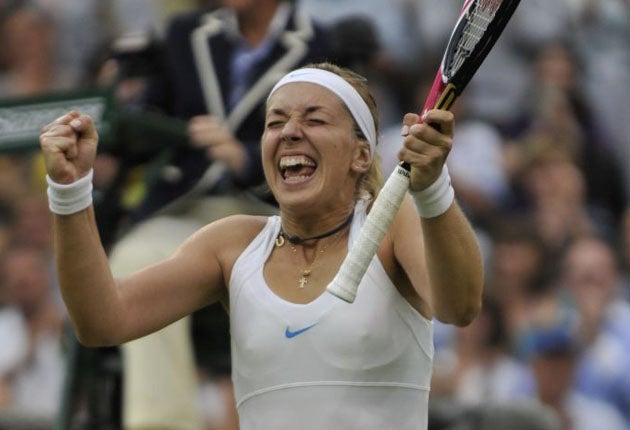Lisicki enjoys centre stage to make her thunderous advance

Your support helps us to tell the story
From reproductive rights to climate change to Big Tech, The Independent is on the ground when the story is developing. Whether it's investigating the financials of Elon Musk's pro-Trump PAC or producing our latest documentary, 'The A Word', which shines a light on the American women fighting for reproductive rights, we know how important it is to parse out the facts from the messaging.
At such a critical moment in US history, we need reporters on the ground. Your donation allows us to keep sending journalists to speak to both sides of the story.
The Independent is trusted by Americans across the entire political spectrum. And unlike many other quality news outlets, we choose not to lock Americans out of our reporting and analysis with paywalls. We believe quality journalism should be available to everyone, paid for by those who can afford it.
Your support makes all the difference.With her vivid joys and dreads, Sabine Lisicki is not just emerging as a plausible winner of this tournament. For the breakthrough she made yesterday – a quarter-final defeat of Marion Bartoli, 6-4, 6-7, 6-1 – resembled an early bloom of springtime, of some overdue renaissance in the women's game.
The first German to make the last four here since Steffi Graf in 1999, Lisicki has every right to become an authentic star, above all on grass. Her notoriously virile serve – reckoned "impossible for a woman" by the French Open winner, Li Na, after her shock defeat in the second round – is only the foundation. Upon it, diversity and delicacy take flourishing root. At 21, moreover, Lisicki has relatively few miles on the clock. She reached the quarter-finals two years ago, but her fulfilment since had been so hindered by injury that she is only here on a wild card.
At the same time, this match disclosed frailties she must still address for a leading, lasting role in the generation that has hitherto hesitated behind the Williams sisters. Lisicki missed three match points when serving for the second set, and lost the consequent tie-break. Perhaps only her opponent's fatigue – palpably wilting after her gruelling encounter with Serena Williams, in stifling heat the previous afternoon – spared her further mental excoriation. But then the whole match had seemed a study in psychological attrition.
For the players' inner tumult was mirrored, and compounded, by the thunderstorm that raged upon the Centre Court roof during the first two sets. At times, the din was such that the players could barely hear line calls. The very spars and girders of the roof, and the grey folds between, seemed almost to represent some giant cerebrum – that inner arena, where commensurate athletic abilities are divided by the turmoil of belief.
From the outside, at any rate, these two thriving players – as champions at Eastbourne and Birmingham respectively, unbeaten on grass this year – seemed to exude different aspects of the tempest. With that big first serve, the German was providing Donner und Blitzen; Bartoli, the black clouds. All her manic antics between points – the swatting of invisible winners, the restive mutterings – disclose the strange, brooding ambition that fortifies a fairly two-dimensional game. Lacking Lisicki's invention, however, she simply could not survive a dip in its ferocity.
Quite apart from her struggle with Williams, Bartoli had endured a three-hour match in the previous round. Lisicki duly gave her the runaround, repeatedly teasing her with drop shots from the baseline, and ending up with 52 winners against a bare dozen for the Frenchwoman. After two hours and 21 minutes, Bartoli no longer had energy even for her nervous rituals – which somewhat begged the question how much they must themselves consume. "My mind was trying extremely hard," Bartoli said. "But my body just couldn't do any more."
Lisicki knows the feeling, having ended her French Open on a stretcher. She has also had to recover from a serious ankle injury, initially misdiagnosed. Hence her simple, infectious pleasure in coming back tomorrow. In a broadened perspective, even Maria Sharapova need not be so daunting.
"Two years ago I was more nervous," Lisicki said. "I couldn't sleep. But now it's different. After the injury, it's so nice to be back. I know how fast it can be gone, so I just try to enjoy every minute I'm on the court. I have absolutely nothing to lose. I'm so thankful to be out there on court again, I'm enjoying every minute." And nor, judging from the ardour of the crowd, is she alone in that.
Join our commenting forum
Join thought-provoking conversations, follow other Independent readers and see their replies
Comments